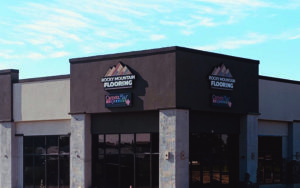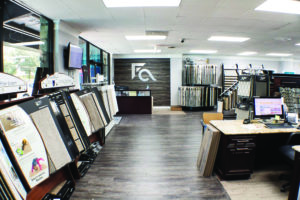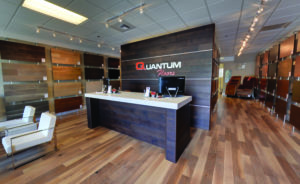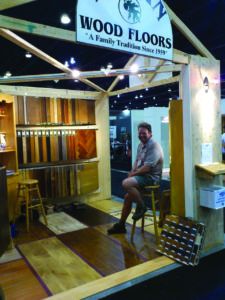By Elisabeth McGowan When it comes to competing with big box stores, conventional wisdom suggests that specialty floor covering retailers should steer clear of the big, bad home centers. However, successful flooring stores are looking to turn that premise on its head by demonstrating that specialty retailers can, in fact, compete with home centers in their own backyard—even if it’s not on the same terms or playing field. In other words, keep your friends close but your enemies closer, so the saying goes. Following are several accounts of retailers who have achieved success despite their close proximity to the big boxes.
Rocky Mountain Flooring
Twin Falls, Idaho

The Twin Falls store moved in across the street from a much larger retailer and just two blocks away from a Home Depot at the end of 2019. Yet, it still thrives.
“I think [being near a big box] has helped us,” said Brent Compton, owner of Rocky Mountain Flooring. “I think it’s the right choice for anyone. I’ve always been told, for the last 15 years, to build next to your biggest competitor.”
According to Compton, customers find their way to his store to compare installation prices after either visiting the home center or seeing its advertisement. Compton said his store tends to offer installation at around 15% less than the nearby competitor. “They spend a lot on advertising, so, we’ve had customers come in asking about installation fees [to compare].”
Another reason customers come back is the staff’s expertise. The Rocky Mountain Flooring team is well versed on its products, which goes a long way in instilling confidence in the consumer. This serves as a major point of differentiation from the big box store, which tends to focus on the DIY consumer. “[Big boxes] have a lot of DIYers, but we have the product knowledge,” Compton added.
Flooring Atlanta
Kennesaw, Ga.

Flooring Atlanta in Kennesaw, Ga., not only shares a property line with a larger flooring retailer, but it is also located near a major home center. Rob Brookshire, store manager, said closeness to a big box works for his store but might not for all retailers.
“I think it depends on what they offer,” he said. “Customers are shopping at [big boxes] because inventory is readily available. If a [specialty] store doesn’t have the capacity to have inventory, I’d say no, it’s not to their benefit. But if they do stock, then I’d say open up.”
One of the most obvious distinctions customers make between the larger retailer and Brookshire’s store is the array of products. Seven out of 10 times, Brookshire said his customers are wowed by his detailed, organized showroom after shopping at the big box. Another advantage is the fact that he sells carpet; the nearby competitor does not. This surprises new customers because most assume a physically larger retailer would carry more flooring products.
Quantum Floors
Boynton Beach, Fla.

Randy Downs, marketing manager of Quantum Floors, said three of his four stores are located near a big box—one of which is Lowe’s. Downs said he believes the perspective on working near a larger competitor has evolved. “I went to school for marketing and back then, [being near a big box] was a bad idea,” he explained. “I think that’s an ancient way of thinking now.”
Downs emphasized two noticeable differences between big box stores and his stores: customer referral and sample size offerings.
“We certainly offer a higher level of customer service,” Downs said. As a result, around 30%-35% of his customer traffic is based on word of mouth from satisfied customers. Downs also pointed out that modern ways of communication ensure faster and easier referral methods, specifically social media.
Sample sizes are another opportunity to gain the upper hand on the competition. As it turns out, the nearby larger retailers to Quantum Floors do not offer similar or larger samples. “We let customers take a two or three-foot sample,” Downs said.
Quantum Floors also makes shopping/sampling more convenient for the customer by not requiring her to return the samples to the retailer. Downs said his staff collects the samples from the customer when they measure her home for the installation.
Acorn Wood Floors
Surrey, British Columbia

British Columbia-based Acorn Wood Floors is located in close proximity to a much bigger flooring retailer, with a much larger footprint and presence. For Ron Teljeur, owner, the key to success in this situation lies in capitalizing on your strengths.
“If you compete head- to-head, they may wear you down,” Teljeur said. “You need a noticeable difference in customer service, products and dependability.”
One key advantage is Acorn Wood Floors performs sand and finish work, while the larger retailer does not. In fact, Teljeur said the larger retailer as well as sales reps from a nearby Home Depot often send customers his way to take on these sanding and refinishing projects.
One concern for specialty retailers like Acorn Wood Floors, though, is the higher pricing structure in comparison to a home center’s typically less-expensive DIY products. However, Teljeur said transparency is key. “We are honest and explain why we are higher priced than the other stores,” he explained. “Our starting prices on materials fall in the mid to high end of theirs.”

